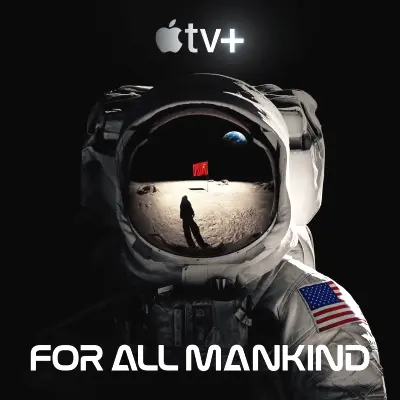For All Mankind seems torn between heading off in bold new directions and simply playing the NASA greatest hits
-

"I should be the ideal target audience of For All Mankind, in which the Soviets beat America to putting the first footprints on lunar soil, setting off a cascade of changes to the history that we know," says Alan Sepinwall. "The subject is catnip for me, as is a creative team led by Battlestar Galactica‘s Ronald D. Moore. But through the eight episodes Apple made available to critics, the series is mostly in test-pilot mode, struggling to figure out how far and fast it can go while surviving the journey. Now and then it manages to fly beautifully — and on the whole is easily the best of Apple TV+’s underwhelming debut class of shows — but it doesn’t seem to know the best way to get where it’s going." He adds that "the show’s reality grows more different from our own as time goes on, but at such a slowly escalating rate as to make the thought exercise behind it feel too abstract."
ALSO:
- For All Mankind doesn’t trust its audience to keep up: Ronald D. Moore "makes a critical error during entry by focusing on Ed Baldwin (Joel Kinnaman), a fictional creation for the show and an astronaut who flew on an Apollo 10 mission that passed up the chance to land on the lunar surface before Armstrong, Aldrin, and Collins," says Steve Greene. "Over the opening hours, Ed’s main role seems to be the designated summarizer, rewording jargon-laced speeches and monumental personnel decisions in plain speak. Having a blank slate at the heart of the show not only makes it uninteresting, but his repeated explanatory role underlines the points where For All Mankind doesn’t trust its audience to keep up. This, sadly, becomes a recurring problem. If there’s one thing “For All Mankind” does more than anything else, it’s remind you what’s at stake."
- All that is left is hope For All Mankind can be a good series: "As exciting as it is to have Moore at the helm again, his vision here is in danger of looking quaint compared to the rest of Apple TV+’s offerings at launch, not to mention the rest of the streaming and network landscape," says Danette Chavez. "A lot of detail (and money) went into For All Mankind’s production, from the archival footage that opens most episodes to the fondue set in the Baldwin home to the replica set of the Mission Control. Most of the sequences shot in space are either dizzying or dazzling (though the effect is lessened by the fact that Apple TV+ doesn’t allow for full-screen viewing on a laptop). But unless you’re the type to go have gone to space camp (we exist), there’s no immediate hook, nothing that quite screams 'Mad Men set at NASA,' as the show was originally framed. There is conflict and love and ambition in the lives of these astronauts, would-be astronauts, and their families."
- For All Mankind could've been, at best, A League of Their Own in space: "Sadly, on my second time through, For All Mankind did not reveal any Rosetta stone of internal design that I’d missed the first time...," says Kathryn VanArendonk. "It only got more frustrating that I still couldn’t quite see it as the show I most wanted it to be — a daring, swashbuckling, women-centric story about the space race, full of guts and humor and camaraderie and mistakes and victories."
- The show prioritizes cynical alternate history’s tedious political maneuvering over its characters: "Cynicism suffuses the series both subtly, with its framing of NASA as a pawn of the president’s administration, and overtly, with Wernher von Braun (Colm Feore), the German aerospace engineer who designed the Saturn V, saying that 'every political system is flawed, and every bureaucracy is corrupt," says Niv. M. Sultan. "Soviet points of view are almost entirely absent from the series, but the American cronies on hand justify his mistrust."
- For All Mankind is the rare Space Age narrative that does not think everything America did during the Cold War was totally awesome: "Instead of hagiography, it spends a lot of time examining the consequences of those famous achievements," says Christian Holub.
- For All Mankind is undeniably compelling: "The toxic weight of American exceptionalism hangs heavy in the air throughout the season, and the show’s own stance on it is murky until deeper in the season as the costs of taking huge risks — both personally and politically — erode some characters’ once unshakeable faith in their mission and country," says Caroline Framke. "And yet, per the show’s own conjecture, the forced hyper-competition of staying in the space race does, in fact, inspire progress and advanced innovation in a way our reality still hasn’t quite reflected. Do those ends justify the often ruthless means? For All Mankind isn’t always sure — but it’s undeniably compelling to watch it try to figure it out."
- Why Ronald D. Moore opted to do an alt-history of NASA: “I went back to (Apple TV+ co-chief Zack Van Amburg) and said instead of doing a show about what really happened in the 70s, why don’t we do a show that’s about the space program you and I thought we were going to get when we were kids? A much bigger, expanded, bolder program, so I thought let’s do an alternate history show."
TOPICS: For All Mankind, Apple TV+, Joel Kinnaman, Ronald D. Moore, NASA
